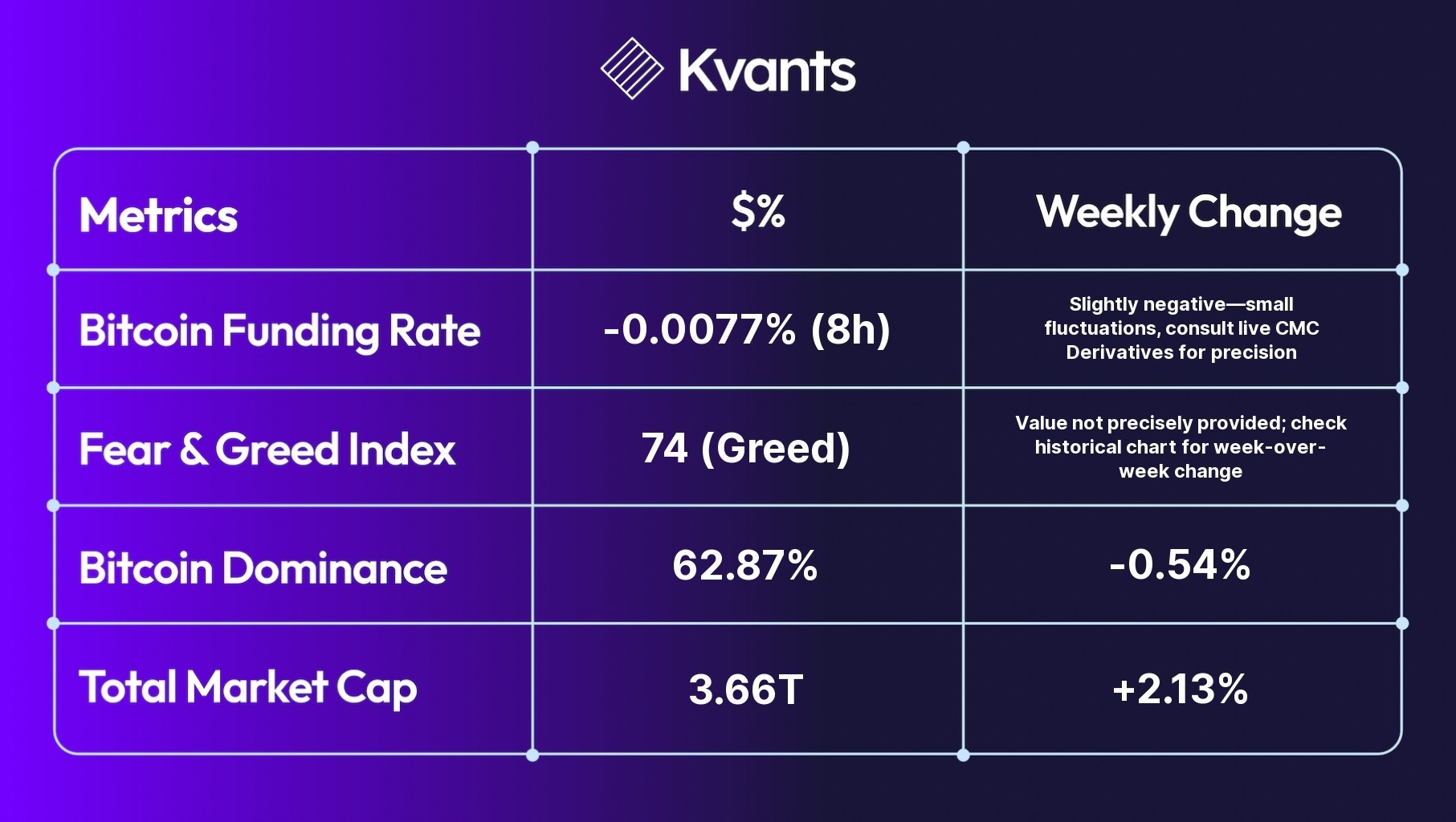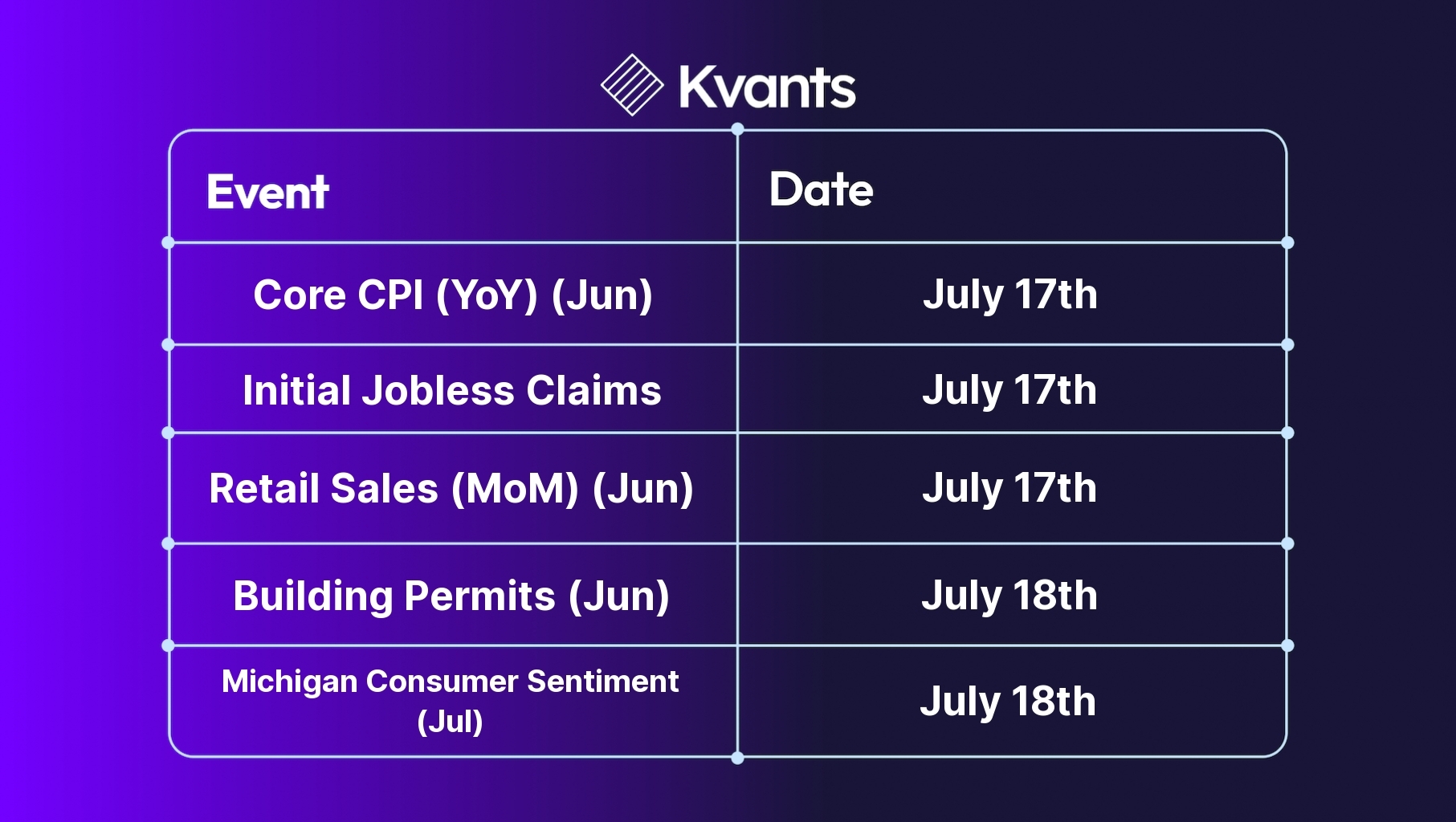- Kvants Newsletter
- Posts
- Crypto exchange BigONE loses $27M in third-party attack
Crypto exchange BigONE loses $27M in third-party attack
Kvants Insights delivers sharp analysis and key updates for digital asset investors navigating a rapidly evolving market.
KVANTS DAILY NEWSLETTER - JUL 16, 2025
Today, the crypto sector witnessed major developments: BigONE exchange suffered a $27M hot wallet breach via a third-party vulnerability, highlighting industry-wide security concerns. Wall Street's Cantor Fitzgerald plans a $3.5B Bitcoin acquisition from Blockstream, signaling growing institutional integration. Peter Thiel made headlines with strategic stakes in BitMine and an Ethereum-focused treasury, reflecting deepening institutional confidence. Regulatory shifts, including the GENUIS Act and upcoming US legislation, are boosting market sentiment and driving mainstream adoption. Uniswap Labs’ president stepped down amid evolving regulatory clarity, while Australia saw its first Bitcoin-backed home loan, blending digital assets with traditional finance. These events underscore the accelerating convergence of crypto and mainstream financial systems.
Crypto exchange BigONE loses $27M in third-party attackBigONE crypto exchange experienced a significant security breach resulting in the loss of roughly 27 million USD after attackers compromised its hot wallet infrastructure. The security team at BigONE identified the breach through abnormal transaction monitoring, swiftly launching an investigation that traced the attack to a third-party vulnerability rather than an internal system failure. Immediate containment steps ensured that the private keys were not exposed and additional losses were blocked. In partnership with blockchain security firm SlowMist, BigONE actively tracked the wallet addresses and monitored the destination of the stolen funds. LINK IMPORTANCEThe incident underscores persistent vulnerabilities within centralized crypto platforms, particularly regarding third-party dependencies and their security postures. Such breaches can undermine user confidence and highlight the ongoing risks associated with hot wallet storage, which balances convenience and security but remains a frequent target for sophisticated attacks. The quick response by BigONE and the collaboration with SlowMist demonstrate a maturing incident response framework within the sector, yet this event is likely to prompt industry-wide introspection about vendor management and monitoring protocols. For institutional stakeholders, the attack renews focus on due diligence requirements when assessing counterparty risk in digital asset custody and exchange services. Ultimately, this breach may accelerate the adoption of more robust multi-signature and cold storage solutions, influencing the operational strategies of both exchanges and asset managers. Cantor Fitzgerald plans $3.5B Bitcoin buy from Adam Back’s Blockstream: ReportsCantor Fitzgerald is close to finalizing a transaction to acquire roughly 30,000 Bitcoin from Blockstream Capital in a deal valued at over three point five billion dollars. The acquisition is being executed through Cantor Equity Partners 1, a special purpose acquisition company managed by Brandon Lutnick. Adam Back, an early Bitcoin advocate and founder of Blockstream Capital, is expected to receive an equity stake in the newly branded entity, BSTR Holdings, as part of the transaction. The company also plans to secure an additional eight hundred million dollars in outside investment to support the merger and acquisition process. LINK IMPORTANCEThis deal signifies a major movement of Bitcoin treasury assets from a prominent institutional holder to one of Wall Street's oldest and most influential financial firms. If completed, it would represent one of the largest Bitcoin transactions ever undertaken by a regulated US entity and further blur the line between traditional finance and digital asset markets. By acquiring a substantial amount of Bitcoin, Cantor Fitzgerald is signaling increased institutional commitment to cryptocurrency as an asset class, a trend that could catalyze broader adoption among legacy financial players. The transaction is also noteworthy since it involves a SPAC structure, suggesting that capital markets innovation continues to shape how crypto assets are accessed and held by mainstream institutions. Observers should monitor how this move impacts both Bitcoin's perceived legitimacy among investors and the strategies of rival financial institutions with respect to crypto treasury holdings. BitMine surges after-hours as Peter Thiel discloses 9% stakePeter Thiel has acquired a 9.1 percent ownership stake in BitMine Immersion Technologies through his venture firm Founders Fund. Following this disclosure, BitMine shares saw a sharp increase of 12.5 percent in after hours trading reflecting investor enthusiasm. Thiel is globally recognized for his leading roles at PayPal and Palantir Technologies and is ranked among the worlds wealthiest individuals. The acquisition signals mounting institutional interest in crypto mining service providers during a period of ongoing digital asset market volatility. LINK IMPORTANCEPeter Thiel's purchase of a significant stake in BitMine Immersion Technologies represents a strong institutional vote of confidence for crypto mining operations. This move may encourage other venture capitalists and institutional players to evaluate or expand their exposure to digital infrastructure companies. The trading spike following the announcement underscores the immediate sensitivity of public crypto focused firms to high profile investor actions and regulatory filings. Thiel’s involvement is particularly meaningful given his track record of identifying disruptive technology trends well ahead of wider adoption. For institutional investors, this event highlights the potential for renewed capital deployment into select cryptocurrency ecosystem firms and the speed with which sentiment can shift based on single stakeholder moves. Peter Thiel Bets Big on Ethereum, Buys Stake in Treasury Firm Chaired by Fundstrat's Tom LeePeter Thiel has made a significant investment in a treasury firm focused on Ethereum which is led by Tom Lee from Fundstrat. This decision comes at a time when there is growing institutional interest in holding Ethereum as part of corporate reserves. BitMine’s move to join other companies in amassing over $500 million in Ethereum reflects a broader trend of blockchain adoption in traditional finance. The strategic intent includes using Ethereum not only as a treasury asset but also to participate in decentralized finance opportunities including staking. LINK IMPORTANCEThe entrance of Peter Thiel into the Ethereum space through a major treasury firm indicates the increasing legitimacy of Ethereum as a reserve asset for high profile institutional investors. This move could signal a shift in corporate treasury strategies as entities look for alternatives to traditional reserve assets in response to macroeconomic forces and the rise of blockchain based financial systems. BitMine’s large scale accumulation of Ethereum demonstrates confidence in the long term value proposition of the blockchain and the economic potential of decentralized applications built on it. Such developments may encourage other publicly traded firms to adopt Ethereum for their balance sheets and explore new financial products such as staking for yield generation. Overall these actions by prominent investors and firms are likely to accelerate the convergence between decentralized finance and traditional financial infrastructure.
Ether Races 6% Against Bitcoin as GENUIS Act Puts Spotlight on Yield-Bearing Stablecoins: AnalystEthereum's ether is experiencing notable gains against bitcoin, driven largely by expectations surrounding the U.S. GENUIS Act, which may prohibit yield payments by stablecoin issuers. The act's possible approval has led to renewed focus on Ethena's synthetic dollar USDe, a product offering yield through derivatives strategies and raising regulatory questions. Ethena's approach to yield generation involves derivatives that might affect Ethereum markets and its compliance with upcoming regulations remains uncertain, especially as it seeks clarification from the U.S. Securities and Exchange Commission regarding its legal status. As the GENUIS Act moves closer to a House vote, market participants are recalibrating their views on Ethereum's ecosystem and the place of yield-bearing stablecoins. LINK IMPORTANCEThe market reaction to ether's surge over bitcoin in anticipation of U.S. legislative action signals the deep interconnection between regulatory developments and digital asset pricing dynamics. The GENUIS Act is a critical legislative step as it would for the first time formally distinguish between payment stablecoins and those offering yield, potentially curtailing a significant revenue stream within decentralized finance. Institutional actors monitoring the space must consider how a ban on interest for stablecoins could force a reorientation of DeFi business models, especially for entities like Ethena that rely on advanced hedging and arbitrage mechanisms. The evolving regulatory posture highlights the importance of jurisdiction, as seen with Ethena's non-U.S. user base and its proactive engagement with the SEC. Overall, the legislative trajectory and market responses reinforce the need for dynamic risk assessment around stablecoin products, Ethereum-linked derivatives, and U.S. regulatory perimeter shifts that could reshape asset flows within the sector. Crypto is Going Mainstream and 'You Can’t Put the Genie Back in the Bottle,' Bitwise SaysBitwise has highlighted that forthcoming US legislation may mark a pivotal moment for the crypto sector with the potential to unlock substantial industry growth and reduce risk. Regulatory clarity is expected to facilitate entry for major financial institutions, allowing billions in investment and possibly moving trillions of assets onto blockchain frameworks. Current bills in congressional focus including the CLARITY Act and GENIUS Act would provide the clear legal signals institutions have awaited to expand into crypto services. Bitwise argues that once regulatory momentum is established and major stakeholders are committed, crypto’s role in the American financial system will be irreversible. LINK IMPORTANCEThis regulatory moment is of major consequence because clear rules are considered a prerequisite for deep institutional participation in digital assets, which would reshape capital markets and investment portfolios. By resolving ambiguity, US lawmakers would clear the way for established players such as JPMorgan, BNY Mellon, and Nasdaq to build fully fledged crypto operations. The passage of these bills would also directly address risk issues that have historically prevented institutions from engaging, most notably the lack of oversight that enabled past collapses of FTX, Terra, and others. Reducing wild swings and negative headline events could stabilize digital asset prices, which in turn may foster greater investor confidence and help mainstream adoption. Finally, bipartisan progress on these regulations points to durable political momentum for the asset class. Once enabled, institutional and retail penetration would create a new normal in which crypto is embedded and intertwined with the broader financial system. Uniswap Labs President Mary-Catherine Lader Steps Down After Four YearsMary Catherine Lader has stepped down as President and COO of Uniswap Labs, ending a four year tenure marked by significant growth and evolution for the firm. Her background at BlackRock allowed her to bridge traditional financial expertise with decentralized finance innovation, contributing to Uniswap Labs' multi blockchain expansion and product launch milestones including its proprietary mobile wallet. Under her leadership, Uniswap established itself as a core infrastructure provider for institutions, developers and retail users in the decentralized exchange sector. The company also navigated major regulatory headwinds, like a Wells notice from the SEC and a settlement with the CFTC, before ultimately entering a period of renewed policy clarity and growth. LINK IMPORTANCELeadership changes at Uniswap Labs signal shifts not only for the company but also for the entire decentralized finance landscape. Mary Catherine Lader’s exit occurs as Uniswap stands at the forefront of industry regulatory and technological transformation, maintaining its status as a foundational platform with more than 5.3 billion dollars in total value locked. Her successful navigation of Uniswap through regulatory scrutiny by both the SEC and CFTC underscores the firm’s ability to adapt and survive in a volatile political and compliance environment, which is essential for ongoing institutional adoption. The timing of her departure – after both regulatory dust has settled and following a decisive pro crypto pivot from the U.S. government – allows Uniswap to pursue its objectives with renewed legitimacy and policy support. The increased involvement of established finance professionals like Lader in DeFi highlights the ongoing convergence of traditional and decentralized markets, a trend institutional investors continue to watch for both opportunity and risk. Looking ahead, the search for her successor and continued adaptation to evolving U.S. policy will shape Uniswap’s positioning as a market leader and test its resilience amid sector maturation. Block Earner Launches Australia’s ‘First’ Bitcoin-Backed Home LoanBlock Earner has introduced what it claims is Australia’s first home loan product that permits property buyers to use Bitcoin as collateral for their deposit. This offering enables crypto holders to leverage their digital assets without needing to liquidate them, which could otherwise trigger capital gains events or exposure to price swings. The initiative is geared toward individuals who have accrued substantial value in digital assets but face barriers when attempting to participate in the traditional property market. By bridging digital wealth with real estate financing, Block Earner is aiming to expand the use cases for cryptocurrencies in mainstream financial products. LINK IMPORTANCEThe launch of Block Earner’s Bitcoin backed home loan is an important milestone in both crypto adoption and financial innovation in Australia. The move leverages growing crypto asset bases and provides new liquidity options for individuals who might otherwise be locked out of traditional lending processes. This initiative also sets a precedent for how digital assets could be more seamlessly integrated into long standing sectors such as mortgage lending, which remain highly regulated and conservative. Institutional observers will note that Block Earner's solution comes at a time when regulatory clarity around crypto asset use remains a barrier in many jurisdictions, meaning successful implementations could serve as case studies for policymakers globally. Ultimately, the development illustrates the underlying demand for alternative forms of collateral and signals a broader market shift toward recognition of digital assets as legitimate financial instruments. Economic Events of the Week
|




